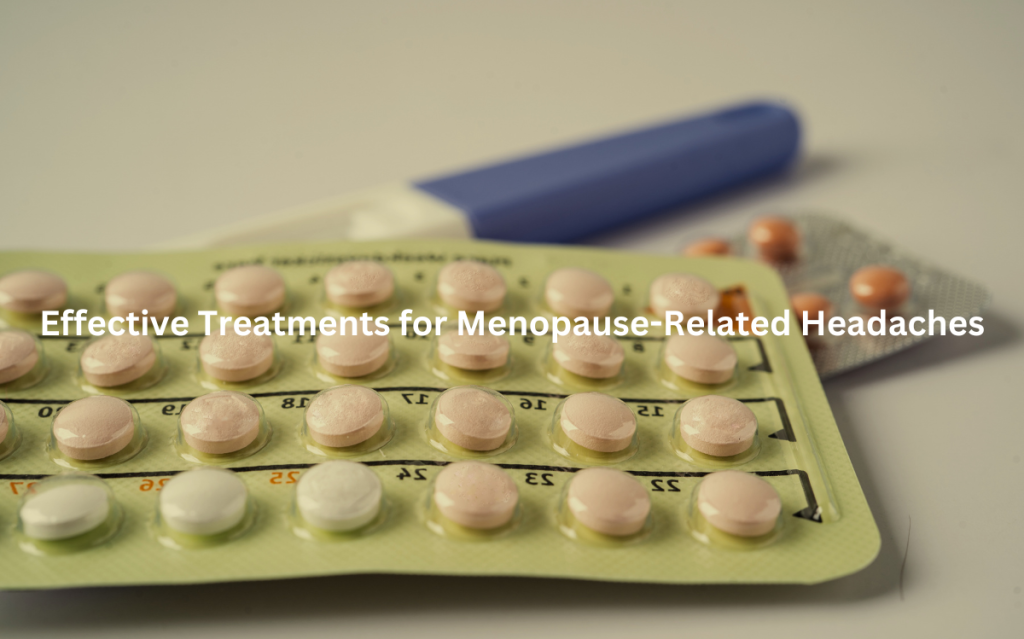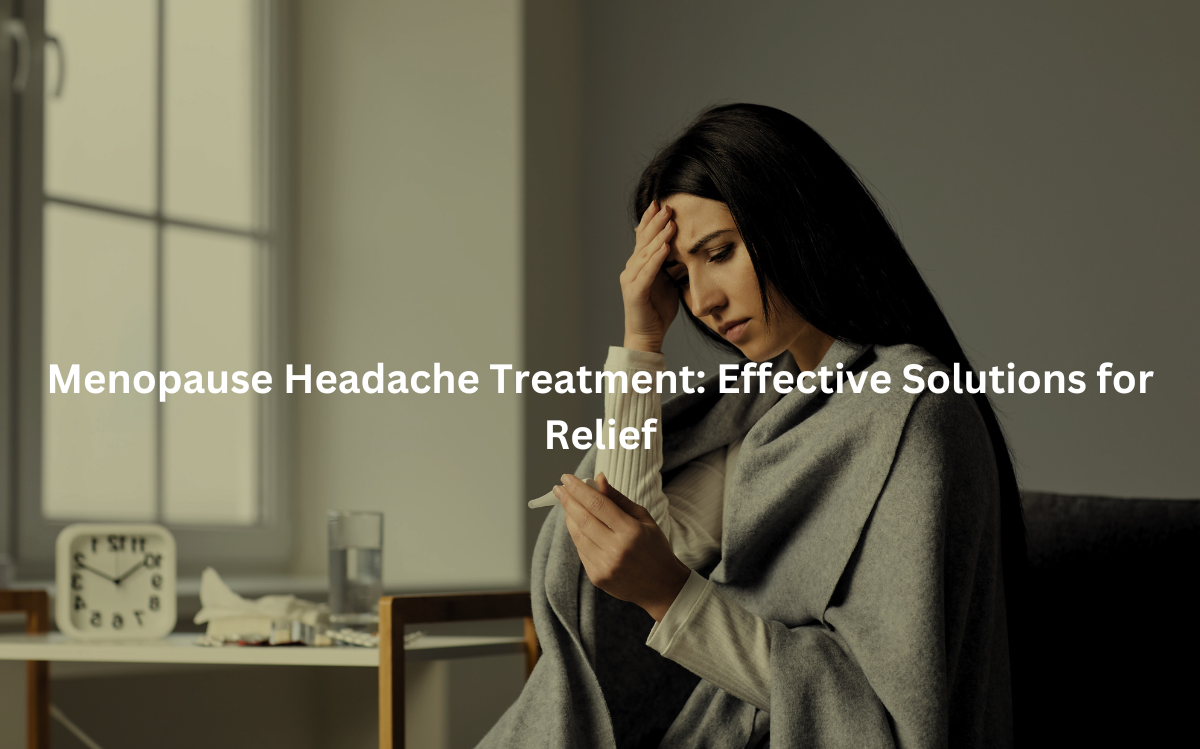Find practical treatments for managing menopause headaches and reduce their impact on your daily life.
Menopause can trigger a variety of symptoms, and one of the most common and debilitating is headaches. Hormonal fluctuations, especially changes in estrogen levels, are often to blame for these headaches.
While these headaches can be challenging, there are multiple treatment options available, from hormone replacement therapy (HRT) to lifestyle adjustments, which can significantly reduce their frequency and severity. (1)
Key Takeaways
- Hormone Replacement Therapy (HRT) can regulate estrogen levels and alleviate menopause-related headaches.
- Lifestyle changes, such as stress management and regular exercise, can help reduce headache frequency.
- Alternative treatments, including acupuncture and supplements, offer relief for those seeking non-medication options.
Understanding Menopause and Its Symptoms
Menopause is a phase every woman experiences. It’s the end of a woman’s reproductive years, marked by the cessation of menstrual cycles. For many women, this phase can hit between 45 and 55, with the average age being 51 in the UK. It’s a natural process but one that brings a host of symptoms—some obvious, others not so much.
These symptoms include hot flashes, night sweats, headaches, mood swings, and irregular periods. Many women also face long-term health risks like heart disease and osteoporosis due to declining estrogen levels.
Menopause doesn’t just appear overnight. It’s a gradual transition, often beginning with perimenopause, the period leading up to menopause. While perimenopause brings irregular cycles and fluctuating hormones, menopause is the complete stop of menstruation.
The shift in hormones impacts the body in many ways—affecting everything from sleep to mood to long-term bone health.
Common Types of Headaches in Menopause
Headaches can be some of the most disruptive symptoms during menopause. These headaches come in all shapes and sizes, but there are a few types that tend to pop up more often. Hormonal headaches and tension headaches are the most common culprits.
Hormonal headaches are directly tied to the fluctuating estrogen levels that define menopause. When estrogen drops, it can trigger headaches, especially migraines.
Many women find themselves struggling with more frequent and intense migraine attacks as their hormone levels dip. Then, there’s the tension headache, often a result of increased stress or disrupted sleep—both of which are common during menopause.
For those who already experience migraines, menopause can make things worse. It’s also common for some women to experience menstrual migraines, which mirror the headaches they had before menopause, often tied to menstrual cycles.
But, with the shift in hormones, these migraines might come more often, and with greater intensity. (2)
How Menopause Affects Hormonal Levels and Headache Frequency
Estrogen isn’t just responsible for regulating the reproductive system—it also plays a major role in how the brain processes pain.
When estrogen levels fluctuate during perimenopause and menopause, the body reacts in several ways. One major way is through headaches. With the drop in estrogen, women can experience an increase in headache frequency, and for some, this can trigger full-blown migraines.
Progesterone, another hormone affected by menopause, can also have an impact on headaches. Both estrogen and progesterone work in balance to regulate the body’s pain response. When the levels of these hormones drop, headaches become a more regular occurrence.
But it’s not just about the hormonal changes. The body’s ability to manage stress, sleep disturbances, and other menopause symptoms can make headaches worse. So, the combination of hormonal shifts and external stressors during this time can significantly affect headache frequency and severity.
Effective Treatments for Menopause-Related Headaches

Managing headaches during menopause can be tricky, but there are several treatment options available. For many, Hormone Replacement Therapy (HRT) is a go-to solution.
HRT works by replenishing the estrogen that the body is losing, and it can help reduce many menopause symptoms—including headaches. Some women find that HRT reduces the frequency of their headaches, making them more manageable.
However, not everyone can or wants to take HRT. For those who can’t use it or prefer not to, there are other treatments.
Medications like triptans, which are used for migraine relief, can be helpful. Non-hormonal treatments such as antidepressants or even Cognitive Behavioral Therapy (CBT) might also help in managing the emotional toll that menopause often brings, indirectly easing headache symptoms.
In addition to medications, there are lifestyle changes that can be key in reducing headaches. Staying hydrated is crucial—dehydration can often lead to or worsen headaches.
Managing stress is also important, as is getting enough sleep. Regular physical activity, balanced meals, and avoiding headache triggers like certain foods or caffeine can help keep headaches at bay.
Alternative Treatments for Headaches During Menopause
For those looking for something outside the traditional treatments, alternative therapies can offer relief.
Acupuncture, for example, has been shown to reduce the frequency and intensity of headaches for some women. Herbal remedies such as black cohosh or evening primrose oil are popular for managing menopause symptoms and, in some cases, may help reduce headaches.
Magnesium supplements are another popular alternative. Some studies suggest that magnesium may help reduce the frequency of migraines, especially in women going through menopause.
Similarly, vitamin B2 (riboflavin) has been shown to help reduce the frequency of migraines, making it a worthwhile consideration for women looking for a natural remedy.
Mindfulness and relaxation techniques are also gaining traction as methods for managing menopause-related headaches.
By reducing stress and promoting relaxation, these techniques might help prevent headaches before they even start. While the research on these treatments is still ongoing, many women find that they help improve their overall well-being during menopause.
When to Seek Professional Help for Headache Relief
It’s important to know when to seek professional help. Not all headaches during menopause are just “normal” menopause headaches.
If a headache becomes unusually severe, or if it’s accompanied by other symptoms like vision changes, nausea, or confusion, it could be a sign of a more serious issue and requires immediate medical attention.
For chronic or severe headaches, it’s always a good idea to consult a healthcare provider.
For those struggling with headaches that seem to be tied to their hormonal changes, a referral to a menopause specialist or even a neurologist might be necessary. These professionals can help create a tailored treatment plan that addresses both menopause symptoms and headaches in a way that makes sense for the individual.
Preventing Menopause-Related Headaches
Prevention is often the best medicine. While some headache triggers are inevitable during menopause (hormonal fluctuations are a given), there are steps women can take to reduce their risk.
First and foremost, managing hydration is crucial. Dehydration is a common headache trigger, especially during menopause when hot flashes and night sweats can leave the body more dehydrated than usual. Drinking plenty of water throughout the day can help prevent this.
Stress management is another important piece of the puzzle. Menopause can bring emotional upheaval, but finding ways to cope with stress—through exercise, meditation, or relaxation techniques—can make a big difference.
Getting enough sleep is also key. Sleep disturbances are common during menopause, but good sleep hygiene and relaxation before bedtime can help improve sleep quality.
Finally, regular exercise is a proven way to reduce the frequency of headaches. Women going through menopause should aim for at least 30 minutes of moderate exercise most days of the week. Exercise helps regulate hormones, improves mood, and reduces stress—three things that can all contribute to fewer headaches.
The Role of Estrogen and Progesterone in Headache Management
As mentioned, estrogen plays a significant role in how headaches develop during menopause. For women who struggle with headaches, especially migraines, HRT can be an effective treatment. By replenishing estrogen, HRT helps bring hormone levels back into balance, often reducing the severity and frequency of headaches.
But what if a woman can’t tolerate estrogen-based therapies? That’s where progesterone can come in. Progesterone, a hormone that works alongside estrogen, can be used on its own to help manage symptoms.
Some women find that a balance of estrogen and progesterone through HRT can help relieve both menopause symptoms and headaches.
It’s always worth discussing options with a healthcare provider. They can help determine the best hormone therapy, whether that’s a combined estrogen-progesterone treatment or a different approach altogether.
The goal is to find a balance that works to reduce headaches while also managing the other menopause symptoms that may be present.
Conclusion
Menopause can be a tough transition, and headaches are one of the most challenging symptoms for many women. But, with a variety of treatments available—from HRT to alternative therapies to lifestyle changes—women have options.
It’s all about finding the right combination of treatments and strategies to help ease the transition and keep headaches at a manageable level. And when things get tough, seeking professional help can make all the difference.
Don’t let menopause take control—book your consultation with Modern Menopause today and find support to manage your headaches.
FAQ
How can top doctors help with menopause headache treatment?
Top doctors play a crucial role in managing menopause headaches. By considering factors like hormonal shifts, female hormones, and nervous system responses, they can offer treatment options tailored to individual needs.
For women suffering from migraine headaches or other types of headaches, seeking expert advice from top doctors can help identify the best approaches, such as preventative treatment or lifestyle changes, to reduce headache pain.
How can lack of sleep contribute to menopause headache pain?
Lack of sleep can worsen headache pain during menopause, especially with conditions like migraine headaches. Sleep deprivation can affect the nervous system, increasing sensitivity to migraine pain and other types of headaches.
For women struggling with lack of sleep and menstrual cycle changes, managing sleep hygiene is crucial for preventing migraine pain and reducing overall headache frequency.
How do female hormones affect menopause headaches?
During menopause, fluctuations in female hormones can trigger headache pain, including migraines. Hormonal changes impact the nervous system, making women more prone to migraine headaches and tension headaches.
Managing these hormonal shifts through lifestyle changes or treatments can help reduce the severity and frequency of headaches like migraines and sinus headaches.
What are the most common types of headaches during menopause?
During menopause, the most common types of headaches are migraine headaches, sinus headaches, and tension headaches.
Hormonal changes, like those affecting the menstrual cycle, can contribute to headache pain. These headaches can affect various areas, such as the side of the head, and may worsen due to lack of sleep, stress, or flashing lights.
Can flashing lights trigger menopause headaches?
Yes, flashing lights can trigger migraines and worsen other types of headaches during menopause. Women with migraine pain may find that flashing lights intensify their symptoms, especially during hormonal fluctuations.
Preventative treatments, like avoiding bright lights and managing stress, can help mitigate the impact of these triggers.
How does high blood pressure affect menopause headaches?
High blood pressure can make menopause headaches worse, especially for women prone to migraine headaches or cluster headaches.
Elevated blood pressure can heighten headache pain and affect the nervous system, making it harder to prevent migraines. Managing blood pressure through lifestyle changes and preventative treatment is essential to reduce headache frequency and severity.
Can preventative treatment help reduce the frequency of menopause headaches?
Yes, preventative treatment can be effective in reducing the frequency of menopause headaches, including migraines and tension headaches.
Medically reviewed treatments may include lifestyle changes, medications, and therapies targeting the nervous system to help prevent migraines and alleviate headache pain associated with menopause.
How does the menstrual cycle affect menopause headaches?
The menstrual cycle can impact menopause headaches by triggering hormonal shifts that affect female hormones.
These fluctuations can lead to migraines, sinus headaches, and other types of headaches. Monitoring these changes and adjusting treatment for headache pain can help manage the intensity of headaches during menopause, especially when combined with lifestyle adjustments.
References
- https://pubmed.ncbi.nlm.nih.gov/29508091/
- https://thebms.org.uk/wp-content/uploads/2022/12/06-BMS-TfC-Migraine-and-HRT-NOV2022-A.pdf

Leave a Reply